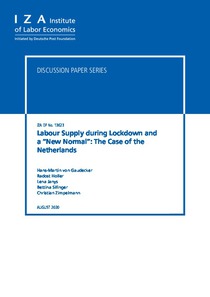Labour supply during lockdown and a "new normal": the case of the Netherlands

von Gaudecker, Hans-Martin ; Holler, Radost ; Janys, Lena ; Siflinger, Bettina M. ; Zimpelmann, Christian
Institute of Labor Economics, Bonn
IZA - Bonn
2020
39 p.
epidemic disease ; working time ; telework ; labour supply
Discussion Paper
13623
Working time and leave
English
Bibliogr.
"We document the evolution of hours of work using monthly data from February to June 2020. During this period, the Netherlands experienced a quick spread of the SARS-CoV-2 virus, enacted a lockdown for a period of six weeks and gradually opened thereafter. We show that during lock-down, substitutability between work from home and at the workplace or essential worker status are key to maintain a large fraction of pre-crisis hours of work. These pandemic-specific mechanisms become much less important as social distancing restrictions are eased in May and June. Labor supply recovers quickly in sectors affected heavily during lockdown, but goes down in other areas of the economy. The latter is unlikely caused by pandemic-induced supply changes; diminished demand is a more plausible explanation. Analyzing take-up of economic support programs, we find suggestive evidence that wage subsidies and other programs helped limit the early-stage impact of the crisis along the extensive margin."
Digital
The ETUI is co-funded by the European Union. Views and opinions expressed are however those of the author(s) only and do not necessarily reflect those of the European Union or the ETUI.